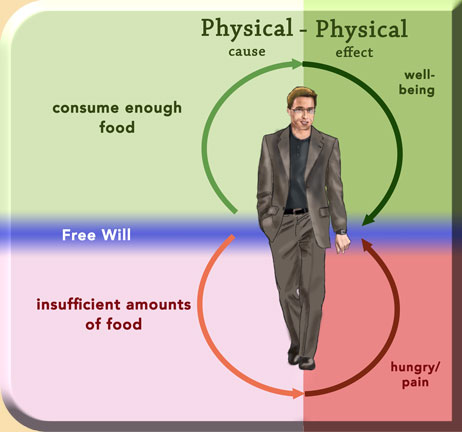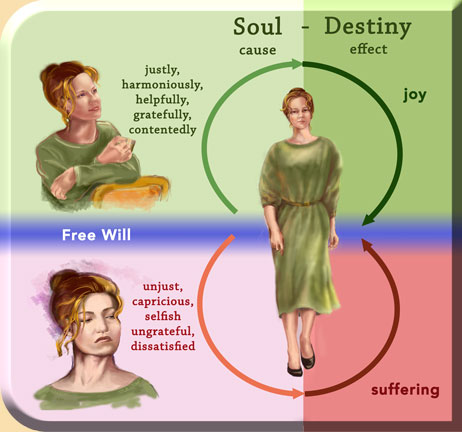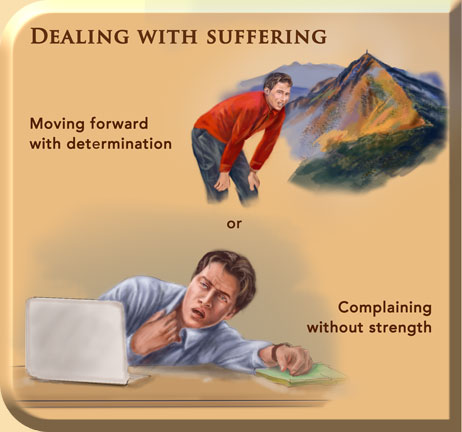
back to homepage
Suffering
has a purpose!
Suffering… is something that nobody wants to experience in their lives, whether physically or emotionally. Medicine, however, has concluded that pain is very important because it warns the body of greater damage.
What about emotional suffering? Does it have a purpose, too?
Initially, I would like to begin my considerations with physical suffering, for examplepain, which has been extensively researched by natural science. The principle of cause and effect has been recognized for all types of pain.
Any physical cause will have a physical effect. It is important to consider that people always have their Free Will of decision. If we consume insufficient amounts of food, this is the cause of our body becoming hungry, for examplefeeling pain. If, on the other hand, we consume enough food, the effect is well-being.
Medicine views pain as an indication of physical needs, and a warning sign of greater damage. Doctors therefore always strive to identify the causes of a disease as early as possible.
In recent decades, medicine has recognized that psychological and emotional conditions are also the cause of physical suffering. This is referred to as psychosomatic suffering. Fear and worries of our soul are demonstrably the cause of physical suffering such as stomach complaints. Although classical natural science struggles with the concept of the soul, causes of physical suffering are recognized
But do emotional causes only affect the body?
Because the laws of nature are uniformly manifested in the gross matter of the body and the subtle matter of the soul, we can take it one step further. The soul of a person, their peculiarities, sensations, words and actions influence not only the human body, but also their fate and especially the suffering ahead of them.
Jesus Christ explained this with the words:
„What a man sows, he shall reap.“
The words do not only refer to agriculture, but to the fate of humanity. Those who sow suffering will reap suffering many times over. Hinduism and Buddhism also speak of the law of karma, which in principle states something similar.
The soul influences its future destiny by itself. The law of cause and effect is therefore the main reason for the emergence of suffering. It is in the nature of human beings to have free will in our decisions. For example, if we always behave justly, harmoniously, helpfully, gratefully and contentedly, we will create the cause for the same kind of seed to reach us multiplied as a harvest. As a result, we will experience joy and happiness.
On the other hand, if we are unjust, capricious, selfish, ungrateful, and dissatisfied, we will also reap what we sow, namely suffering.
By experiencing suffering, we are encouraged to reflect and examine whether it would be appropriate to change our behavior. A well-known German proverb says:
Self-awareness is the first step to improvement.
The law of cause and effect, sowing and reaping, aims to lead us precisely to this self-knowledge. It is the basic prerequisite for a person with free will to change their behavior.
Suffering occurs for several reasons. For one, already described as:
1. Backlash of previous actions
But we also experience suffering for another reason. It is intended to reinforce our dormant abilities, because overcoming obstacles promotes our development. If we look at an unpleasant situation from the past, we often realize that in retrospect the experience was helpful for us after all. Like in an individual training program, we are guided on earth to the experiences that are to promote us in our development.
The second reason for the emergence of suffering is:
2. Incentive for development
The first two points are therefore especially related to us and are brought about by the laws of nature. This happens also by coincidental appearing connections. They are the events where fellow men inflict suffering on us of all people, although it could have hit others just as well. Everything that is supplied to us by the laws of nature is to promote our development.
The third way of creating suffering is not for our benefit, because it brings us suffering through:
3. Arbitrariness of our peers
On earth, noble and inferior people can live intermingled side by side. This is only possible on earth, because in the afterlife souls are separated according to their internal purity. The consequence of this is that good people on earth often have to suffer under bad ones, because the free will of the lower-oriented person remains unrestricted.
Friedrich Schiller explains the process as follows:
“The most pious man may not live in peace..,
if it does not please the wicked neighbor.”
Great human suffering like the dropping of the atomic bomb or the various genocides were only possible for this reason. Many of the victims were not personally responsible for this suffering. Every perpetrator has his free will to inflict senseless suffering on others, he does not need to abide by any rules, not even the law of cause and effect. Consequently, there is unjust suffering on earth. The perpetrator is only free to act, but is bound to the effects of the suffering he causes. He must bear the responsibility no matter what.
Due to the complexity of these three points, suffering on earth cannot be easily assigned. Much of the suffering that afflicts a person was already caused in his or her previous life. Since we were given a new brain at birth, we cannot remember previous lives in our consciousness. Consequently, we are unable to see the connection between cause and effect, and experienced suffering often appears to us as unjust. Also, suffering caused in this life often reaches us years or decades later, which makes it difficult to relate.
It is difficult to distinguish whether suffering at the hands of others is a repercussion of our past misconduct, or whether it is inflicted arbitrarily by others through no fault of our own.
However, all suffering on earth is brought about by man himself, because the development of man is also possible without suffering. We, as human beings, have chosen the path of our development, which is full of suffering, ourselves through our actions.
The most important thing when considering suffering is the realization that it has a higher meaning, i.e. that it arose logically and is not an unrelated coincidence. Thus, we will no longer regard difficult situations in life as suffering, but as a task or challenge, which represents assistance in our spiritual development.
As an example, let’s take two people who are suffering physically. Both are extremely exhausted and have difficulty breathing, even though they were perfectly fine yesterday.
The first person is unsure of why he is suffering so much, is complaining, is worried and is afraid.
The second person perceives the same suffering quite differently. She is glad that it will soon be over, sees the suffering as a necessity to reach her goal, because soon she will be at the summit. Having a goal and being able to classify all suffering as meaningful makes the crucial difference. Complaining without strength, or moving forward with determination, depends solely on our internal attitude, on the recognition of the meaning of suffering.
Life on earth can become a mountain climb to a higher goal in our development. However, we consciously expose ourselves to the possibility of suffering, be it through:
Backlash of previous actions
Incentive for development or
Arbitrariness of our peers
If we overcome these challenges, we will achieve the goal we have set. The clearer the mind sees the goal before its eyes, the easier it will be for it to powerfully overcome the obstacles. When it has reached the summit, its goal, it will suddenly have a liberated view. It will look back on the path and
recognize the meaning of the past suffering.
– – –
“Therefore become spiritually free! Burst all the fetters that hold you down! If obstacles present themselves welcome them joyfully; for they show you the way to freedom and strength! Look upon them as gifts from which you will benefit, and you will overcome them with ease.
Either such obstacles are put in your way to teach and develop you, in which case you add to the means of your ascent, or they are the reaction to some debt you have incurred, which you can redeem in this way and thus free yourselves. In either case they help you to advance. Therefore set out to meet them with a bold heart, it is for your own good!
It is foolish to talk of reverses of fortune or of trials. Every conflict and every sorrow means progress.“
From the work:
“In the Light of Truth”
Lecture: Awake!



